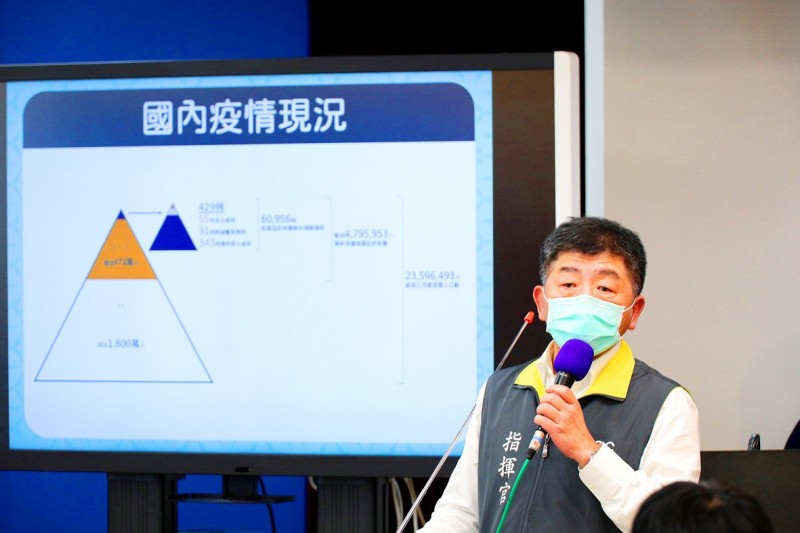《TAIPEI TIMES》Public support key to ‘zero’ cases: Chen

Minister of Health and Welfare Chen Shih-chung, who heads the Central Epidemic Command Center, gives an update on the COVID-19 pandemic at a news conference in Taipei yesterday. Photo courtesy of Central Epidemic Command Center via CNA
100 DAYS: Thanking the public, the health minister talked about critical periods in the nation’s fight against COVID-19 and why the CECC favors targeted testing
By Lee I-chia / Staff reporter
The Central Epidemic Command Center (CECC) yesterday reported no new COVID-19 infections for a third consecutive day, thanking the public for cooperating with and supporting the center since its establishment 100 days ago.
Minister of Health and Welfare Chen Shih-chung (陳時中), who heads the center, added that a total of 307 patients have been released from isolation after recovering.
Of the 429 people who tested positive for the novel coronavirus in Taiwan, 343 cases were imported, 55 were locally acquired and 31 were a cluster infection on the navy supply ship Panshih (磐石), he said.
Yesterday marked the 100th day since the center’s establishment on Jan. 20 and the 16th consecutive day that no domestic case has been confirmed in Taiwan.
“Thank you everyone for overcoming the past 100 days with us together,” Chen said. “There were times when we were more nervous and times when we were more relaxed, but there are still more days to come.”
“So far, it seems like we are headed in the right direction, which is a good sign. However, I must stress that the progress we have made was because of everybody’s cooperation, so we did not have to implement hard regulations or harsh lockdown measures to maintain stable control over the spread of COVID-19,” he said.
People should continue to practice good personal hygiene, social distancing and wear a mask, so that life and the economy can function as normal, and more disease prevention regulations can gradually be eased, he said.
Chen recounted two periods over the past 100 days when he felt the most anxious. The first was when the SuperStar Aquarius cruise ship docked at the Port of Keelung on Feb. 8, and more than 100 passengers were tested for the coronavirus before all passengers were allowed to disembark.
The center had repeatedly gone over situational exercises of passengers onboard a cruise ship testing positive, he said, adding that he was doubly anxious as they awaited the results, he said.
Luckily, no one tested positive, he said.
The second time was before the COVID-19 pandemic swept across Europe and the US, as he had warned that the next wave of cases would likely come from those areas, but the speed of the outbreak exceeded his expectations, he said, adding that he was worried if the nation’s medical capacity would be up to the task.
CECC advisory specialist panel convener Chang Shan-chwen (張上淳) said that local media’s accurate reporting helped people to be more informed about the disease, preventing a public panic.
All healthcare workers and government agencies were well-prepared to deal with a crisis even before the COVID-19 outbreak, and the public has been extraordinarily cooperative with the CECC’s policies, including staying at home when under isolation or quarantine, Chang said.
All these factors contributed to Taiwan’s good performance in fighting COVID-19, he said, adding that he is moved by the nation’s achievement.
As many have expressed concern about the risks of asymptomatic people causing an outbreak in local communities and have often suggested that the CECC conduct widescale testing, Chen gave a 20-minute briefing on the benefits and pitfalls of widescale testing and the targeted testing that the center uses.
Scientific calculations show that the effectiveness of widescale screening is much lower than targeted and precision testing of suspected cases for polymerase chain reaction, he said.
Widescale testing also costs more in terms of financial and medical resources, so the center is not changing its strategy at this time, he added.
新聞來源:TAIPEI TIMES

















